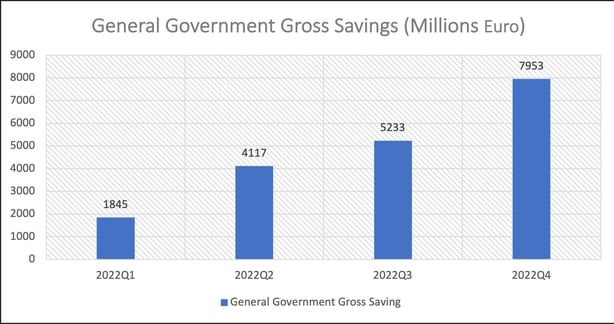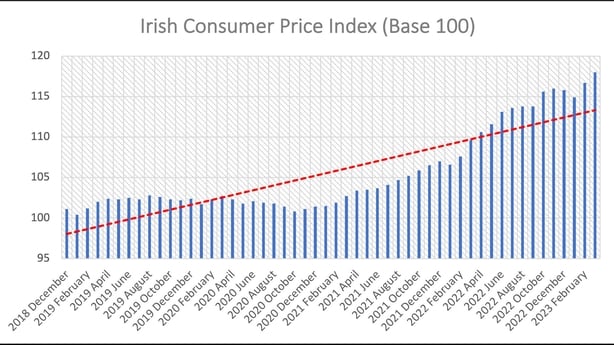Analysis: many areas could use the massive Government surplus, but there are economic reasons why Michael McGrath appears reluctant to spend big
For anyone who hasn't heard the good news, the Government currently has a bit of money lying around. In 2022, tax revenue rose by 22% amounting to an annual increase of about €14.7 billion. Where did the money come from? Mostly greater corporation and income tax receipts. Corporation tax receipts increased from €1.3 billion to €3.2 billion and there was also an increase in taxed income on higher earning households.
In addition to more money coming in, there was also less money going out. Last year saw a significant reduction in pandemic-related payments which had been taking up a large amount of Government expenditure in previous years.
We need your consent to load this rte-player contentWe use rte-player to manage extra content that can set cookies on your device and collect data about your activity. Please review their details and accept them to load the content.Manage Preferences
From RTÉ Radio 1's Morning Ireland, Minister for Finance Michael McGrath discusses the Exchequer surplus for this year, which is expected to be €10 billion
Overall, this has left Minister for Finance Michael McGrath and his colleagues with quite a bit of money in the kitty. The below graph shows the gross government savings in quarter 4 of 2022, which came in at just under €8 billion. The massive surplus in savings was enough to prompt UCC economist Seamus Coffey to paraphrase one of our former Taoiseachs and note that we are living way within our means.
The large amount of funds saved up is surely welcome news for Irish society as we have a few socio-economic issues which could do with fixing. For example, Leo Varadkar has stated that we are still 250,000 houses short of solving the housing crisis. Additionally, we are also suffering from a major problem with overcrowding in our healthcare service.
This begs the question how have the Government managed to rack up such a large amount of savings when we are still in dire need of houses and hospital beds? And if we have the money lying around, why are we not just be spending it and putting an end to our housing and healthcare problems?

To explain why the Government might be refraining from splurging their new savings, I can rely on one of my favourite sayings in economics; there are no solutions, only trade-offs. This phrase is attributed to African-American economist, Thomas Sowell. It should be kept in mind that Sowell is very much rooted in the more classical right-wing branch of economics which generally opposes government spending and interference. That being said, his phrase regarding trade-offs does shed light on the difficulties associated with governing an economy and why governments may want to refrain from spending all they have.
In the case of the Irish Government, their first fear might be inflation. Solving an issue like the housing crisis, for example, is not purely a numbers game. Yes, there is an issue with the supply of housing in Ireland, but more specifically, there is an issue with the supply of affordable housing. Meaning that the Irish government cannot simply increase the number of houses. They have to increase the number of houses which fall within a certain price bracket. This is where inflation comes into play.
Inflation occurs when there is more money in the economy than there is goods and services being produced. During the pandemic, the Government engaged in large amounts of expenditure while multiple sectors of the economy were being closed down or severely restricted. This meant there was more money relative to production in the economy. At the time, this was a brilliant strategy. Government expenditure during the pandemic was necessary and allowed newly unemployed people to remain in receipt of income from social welfare payments like the PUP. This was a well-needed humanitarian initiative which helped a lot of people in the country get through a very tough period.

But one drawback to all this expenditure was that it facilitated inflation. As time went by after the initial breakout of Covid-19, the prices of the goods and services we require day-to-day began to increase. This can be seen in the graph above which illustrates the increase of inflation in Ireland over the last few years.
As of February 2023, consumer prices were 8.5% higher than they were 12 months earlier so someone earning a salary of €30,000 in 2022 would have lost €2,550 of their purchasing power in 2023 due to inflation. This illustrates the danger involved with increasing the amount of money circulating the economy via government spending without being able to offset it against adequate corresponding increases in production.
If we consider that Ireland has an unemployment rate near what economists would refer to as the natural rate of unemployment, it may be the case that there isn’t much more room for increased production within the economy. Increasing expenditure for new houses could potentially increase the amount of money circulating in the economy without seeing much of a corresponding increase in production – more inflation! This would mean the very mechanism the Government would use to increase the supply of affordable houses could make those same houses unaffordable thus worsening the housing crisis and depleting the national savings.
We need your consent to load this rte-player contentWe use rte-player to manage extra content that can set cookies on your device and collect data about your activity. Please review their details and accept them to load the content.Manage Preferences
From RTÉ Radio 1's News at One, RTÉ Economics Correspondent, Robert Shortt analyses the latest CSO figures about the Government's surplus
Another reason for the Government’s lack of urgency to spend their savings could be recent ECB initiatives which increased interest rates to try and curb inflation. This has provided some with cause for concern that a recession is coming. If this is the case, the Government may want to have the luxury of dipping into the 'rainy day fund’ - otherwise known as the National Reserve Fund - for when a recession hits. Keynesian economic theory would approve of this strategy: it holds that we will need funds to spend our way out of a recession rather than buy our way into one.
All of this isn’t to say that the Government should do nothing about the housing or health crises. Part of governing is making these difficult choices which produce a variety of complex trade-offs. But there are reasons which highlight why the Government may not want to spend big despite having the money to do so.
The views expressed here are those of the author and do not represent or reflect the views of RTÉ








